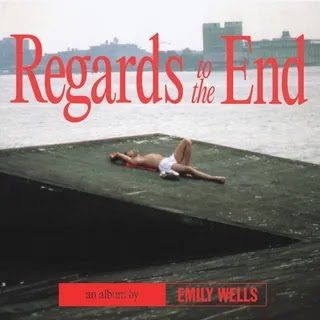The complex, referential new album from the New York-based composer responds to historical crises with sprawling orchestral pop.
Midway through Regards to the End, composer Emily Wells zooms in on a hand scattering grass seed. The image is summoned with a whisper, rustling against soft piano on the lullaby “David’s Got a Problem.” “Throw a little grass out,” she sings in a hazy drawl. “Then go lie among the weeds.” The line nods to late multimedia artist David Wojnarowicz, who used to wander Manhattan’s piers planting abstract meadows in this manner. Wells cites a 1983 photo of Wojnarowicz as inspiration; he lies back in a dilapidated building carpeted with fresh green turf, peeled paint and graffiti splashed against the walls. It’s an instant metaphor: beauty extracted from waste, organic versus manmade matter, the ultimate supremacy of nature. Wells was interested in all of these themes as she wrote Regards to the End, the New York-based polymath’s latest work of textured orchestral pop.
Wells turned to Wojnarowicz’s work during a two year reflection on the AIDS crisis. She marveled at the activist community that sprouted from the tragedy. Their demand for treatment and government recognition, which often fell on deaf ears, reminded Wells of the ongoing climate emergency. Wells grappled with these colossal disasters, poring through pieces by artists and advocates like Kiki Smith, Félix González-Torres, and others. In their complex, weighty structures, the 10 songs on Regards to the End consider the despair they lived through and mimic the catharsis sown from their work.
Lead single “Love Saves the Day” signifies the alchemy of siphoning art from anguish. As she wrote it, Wells thought of David Buckel, the LGBT rights lawyer and environmental activist who self-immolated in Prospect Park four years ago. The moody classical intro hints at grief, but the song is no funeral dirge. Wells’ compact orchestra—upright bass, cello, clarinet, French horn, violin—creeps in with long, nauseous notes before she truncates their phrasing and ups the tempo. Wells shakes the piece into a rousing march; bass clarinet bounces like a Second Line tuba, and patches of synthesizer echo Wells’ vocals as if she’s singing in a tiled underpass. Unexpected details sneak in, like a peppery hi-hat and rapidly plucked violin. Surprise and precision are Wells’ greatest assets as a composer, and Regards to the End is filled with both.
A classically trained multi-instrumentalist, Wells composes in movements, and it is thrilling to trace the slopes of her songs on Regards to the End. Opener “I’m Numbers” unfurls with seasick bowed strings that dissipate in her progressively lush arrangement. She layers slight, clacking percussion, spry keys, and harsh bursts of breath. Her voice, hushed and low, examines a simple but crippling concept: “I’m numbers ’til I’m not.” The phrase suggests mortality and the cold, accountant’s view of marginalized people, who are often referred to as statistics.
Wells is an efficient lyricist. Her compositions sprawl out and swirl, invigorating the few words she offers. On “Love Saves the Day,” she laments vanishing plots of land: “All of my acres, the wet ones, the dry ones,” she sings. “They’ve all been devoured.” The image functions as a metaphor for a sick body, or a dying planet. On the relaxed “Come on Kiki,” she sums up incessant human desire effortlessly: “You don’t stop wanting/You just want differently.” The phrase is followed by velvety, rippling clarinet—an act of restraint framing Wells’ pleas for “more.”
Wells is occasionally too restrained: the latter half of Regards to the End is a sustained lull. “Arnie and Bill to the Rescue” and “The Dress Rehearsal” glide along mid-tempo to sleepy drones, Wells’ voice drenched in reverb. The songs are lovely in a safe way but suffer from sequencing more than anything else. They may have been better suited between the album’s livelier pieces, rather than stacked at the end in an elongated fadeout. Wells’ most exciting music is vibrant and dynamic, throwing the listener into unexpected hairpin turns. In the final third of “Two Dogs Tethered Inside,” Wells’ brooding synth arpeggios swell and fall as a shimmering clarinet bursts through the surface. It’s as if a rugged stone has been cracked open to reveal the sparkling angles of a geode—beauty erupting through the toughest planes.



0 comments:
Post a Comment